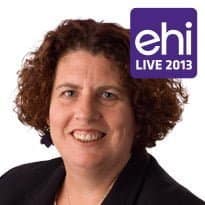Med device regulation not fit for apps
- 6 November 2013

The current regulation of medical devices is not fit for purpose for apps, the clinical director for patient safety at the Health and Social Care Information Centre has said.
Speaking at EHI Live 2013, Dr Maureen Baker said that the very fast development of apps in the health environment has created a need for better safety assurance, but applying medical device directives may not be the way forward.
“The regulatory framework that applied in the medical devices space is not fit for purpose for apps. This is something we need to address because there is a patient safety issue here,” she said.
“We need safety assurance around apps. And we do have to have some thoughts on how to best establish appropriate processes.”
The issue of regulating apps has been a key issue within the HANDI Healthcare Apps stream of EHI Live 2013, with some delegates wary of over-regulating a fast developing market, and others convinced that more regulation is needed.
NHS England indicated yesterday that it was looking at the work done by the US Federal Drugs Administration to regulate apps if they turned the devices they run on into medical devices.
So far, the NHS has taken a less formal approach. The NHS Choices health apps library includes around 150 apps that have gained the NHS stamp of approval.
Dr Baker is part of the HSCIC patient safety team, which was asked to look at these apps to see if they were compliant with clinical risk management standards, using ISB standards such as ISB0129.
“Because these apps are going to be accessed on an NHS site, the public will have an expectation that these will be good and safe apps,” she said.
She added that because the mobile health apps space is so new, the team is still feeling their way a little.
“It’s very experimental, we got these safety processes set up in the safety standards. We are talking about patient facing apps here.
"The only thing my team is interested in is the safety criteria. If something goes wrong, can a patient be harmed?”
She added that every app submitted to the health apps library will be assessed through a triage method to see if it is safety related.
If an app can provide a risk to patient safety, the app developer will have to go through a rigorous process of risk evaluation, mitigation and risk control.
However, most of the apps submitted do not provide any risk to patient safety, said Dr Baker.
“Some 176 apps were submitted through NHS Choices. We did the first triage and the vast majority we found not to be safety related. It left 11 apps for us to work through that have been approved,” she said.
This approach mirrors work carried out by Dr Baker to develop safety standards, safety cases and safety management cultures for healthcare IT.
She talked about these in an earlier session, and said it was time for the NHS to learn from other safety critical industries, such as oil and aviation, which have had standards and processes to implement and run new products and systems safely for many years.
She said it was time for the NHS to adopt a similar approach, using two standards developed for healthcare IT software suppliers – ISB 0129 – and trusts – ISBO 160.
Dr Baker added that how long the team will keep assessing apps is not certain.
“We really aren’t sure if this is an ongoing piece of work or not, that is up to the commissioners and NHS England.”


